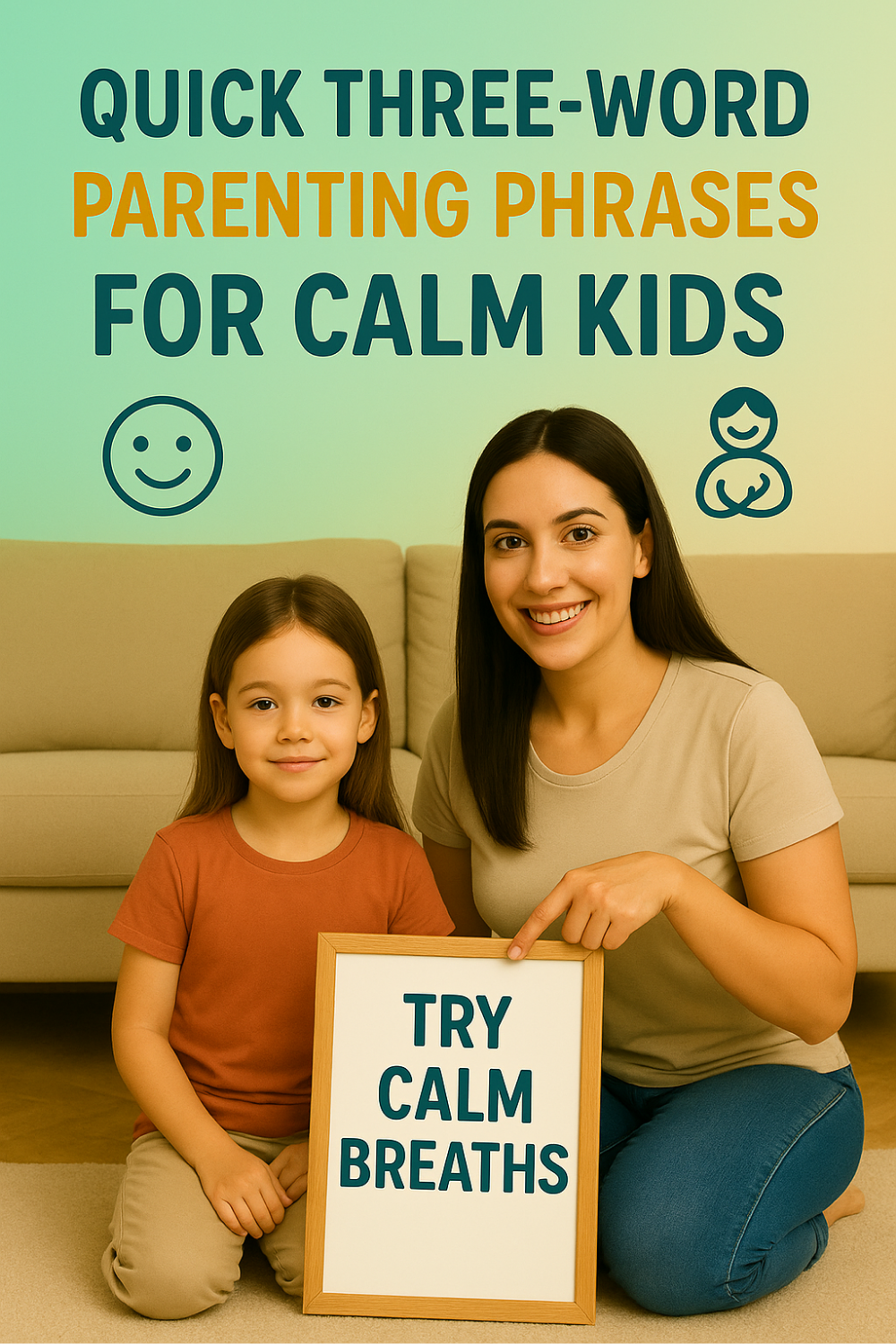Frustrated by endless tantrums and meltdowns? Simple, effective communication can transform your parenting experience quickly. Using clear, concise three-word phrases helps your child calm down, regulate emotions, and respond positively, preventing meltdowns before they begin. Ready for smoother parenting moments and fewer emotional outbursts? Discover exactly which three-word phrases work best and how to implement them today!

- Why Three-Word Phrases Work So Well
- Three-Word Phrases for Immediate Calm
- Clear Instructions in Three Words
- Emotional Validation with Three Words
- Three-Word Choices to Empower Children
- Three-Word Reminders for Positive Behavior
- Consistency and Follow-Through Tips
Why Three-Word Phrases Work So Well
Short, clear communication, particularly three-word phrases, effectively captures children’s attention, especially during emotional distress or overstimulation. Lengthy explanations often overwhelm young children, exacerbating frustration and tantrums.
Using concise three-word instructions or affirmations simplifies communication, making it easy for your child to process and respond quickly. Short phrases also help children anticipate clear consequences or outcomes, significantly reducing uncertainty and stress.
By using fewer words, parents maintain calmness, remain focused, and convey authority positively and clearly, establishing reliable emotional boundaries and expectations consistently.
Three-Word Phrases for Immediate Calm
These simple phrases quickly help your child regain emotional control during a meltdown or anxious moment:
- “Take deep breaths.”
Reminds your child to use breathing techniques for immediate calm. - “You are safe.”
Offers emotional security and reassurance instantly. - “I’m right here.”
Provides comfort and reassurance, alleviating fears or anxiety quickly. - “It will pass.”
Reminds your child that difficult emotions or situations are temporary.
Regularly using these calming phrases significantly helps children manage overwhelming feelings, reducing the duration and intensity of meltdowns.
Clear Instructions in Three Words
Providing clear, concise directions prevents confusion and frustration, reducing potential meltdowns significantly:
- “Put shoes on.”
Directly instructs your child, avoiding debates or confusion. - “Hands to yourself.”
Clearly sets boundaries, immediately reducing unwanted behaviors. - “Time for bed.”
Offers straightforward guidance, reducing bedtime resistance effectively. - “Use gentle hands.”
Clearly reinforces appropriate physical interactions positively.
Consistently using short, clear directions enhances cooperation, reduces miscommunication, and minimizes potential emotional outbursts effectively.
Emotional Validation with Three Words
Acknowledging your child’s emotions quickly defuses tension and builds trust significantly:
- “You seem frustrated.”
Clearly identifies their feelings, instantly validating their experience. - “That’s really tough.”
Empathizes genuinely, reducing feelings of isolation or frustration. - “I hear you.”
Demonstrates active listening and validation instantly. - “It’s okay, cry.”
Permits emotional expression, allowing healthy emotional release.
Regular emotional validation significantly reduces emotional escalation, builds emotional intelligence, and fosters deeper parent-child connections effectively.
Three-Word Choices to Empower Children
Offering clear choices boosts your child’s sense of control and significantly reduces power struggles and tantrums:
- “Milk or juice?”
Simple, clear beverage choices prevent arguments. - “Walk or carry?”
Offers autonomy while maintaining necessary boundaries. - “Blue or green?”
Quickly settles clothing decisions without lengthy debates. - “Puzzle or book?”
Empowers decision-making, promoting independence effectively.
Regularly providing concise choices significantly enhances your child’s confidence, self-esteem, and emotional self-regulation effectively.
Three-Word Reminders for Positive Behavior
Brief, positive behavior reminders quickly reinforce desired behaviors and effectively prevent meltdowns:
- “Use your words.”
Encourages clear verbal communication instead of frustration or physical responses. - “Quiet voices, please.”
Gently reminds children to reduce noise levels instantly. - “Remember gentle touches.”
Effectively encourages appropriate physical interactions positively. - “Calm body, please.”
Quickly reminds your child to manage physical behavior proactively.
Consistently using these concise behavior reminders significantly improves your child’s understanding and compliance, reducing meltdowns effectively.
Consistency and Follow-Through Tips
Effectively using three-word phrases to prevent meltdowns requires consistent implementation and follow-through:
- Stay Calm: Always deliver phrases calmly and confidently.
- Remain Consistent: Regular repetition builds understanding and compliance quickly.
- Follow Through Immediately: Provide clear consequences or rewards promptly to reinforce understanding and trust.
- Use Positive Tone: Always use positive, reassuring language rather than negative criticism.
- Reinforce Regularly: Acknowledge and praise your child’s positive responses consistently.
Applying these simple strategies ensures three-word phrases remain highly effective, consistently improving your child’s emotional regulation and behavior long-term.
Frequently Asked Questions
Why are three-word phrases effective for young children?
They simplify communication, making instructions easy to understand and follow, especially during emotional stress.
What if my child doesn’t respond immediately to these phrases?
Stay calm, repeat the phrase clearly, and give them a moment to respond. Consistent repetition builds effectiveness quickly.
Do three-word phrases work for older children too?
Yes, concise communication remains effective across all ages, especially during emotional or stressful moments.
Can these phrases be used during major meltdowns?
Yes, these concise phrases effectively calm emotional intensity by providing clear direction and reassurance quickly.
Should these phrases replace longer conversations entirely?
No, three-word phrases are highly effective during heightened emotions, but regular, deeper conversations remain essential for ongoing communication.